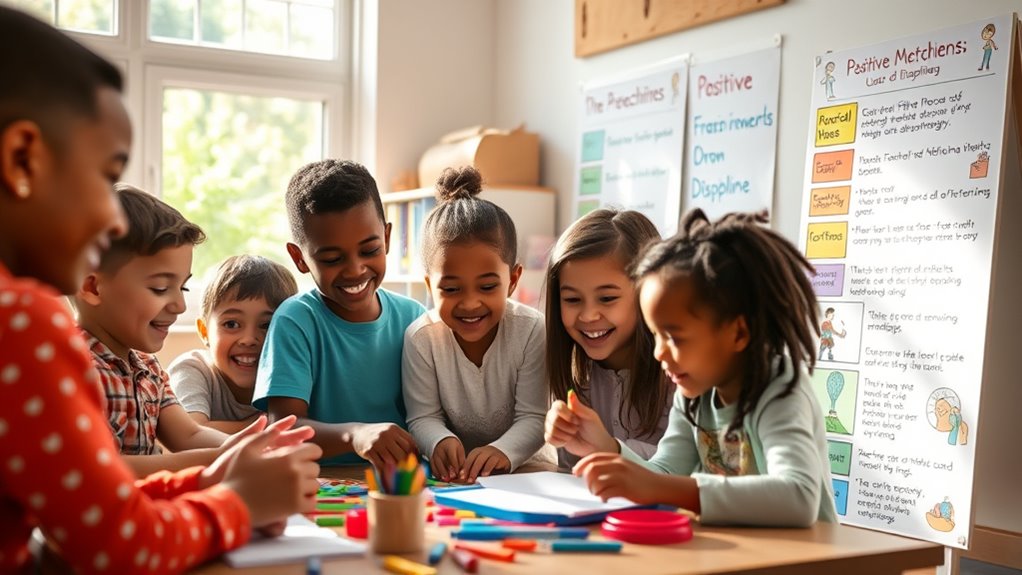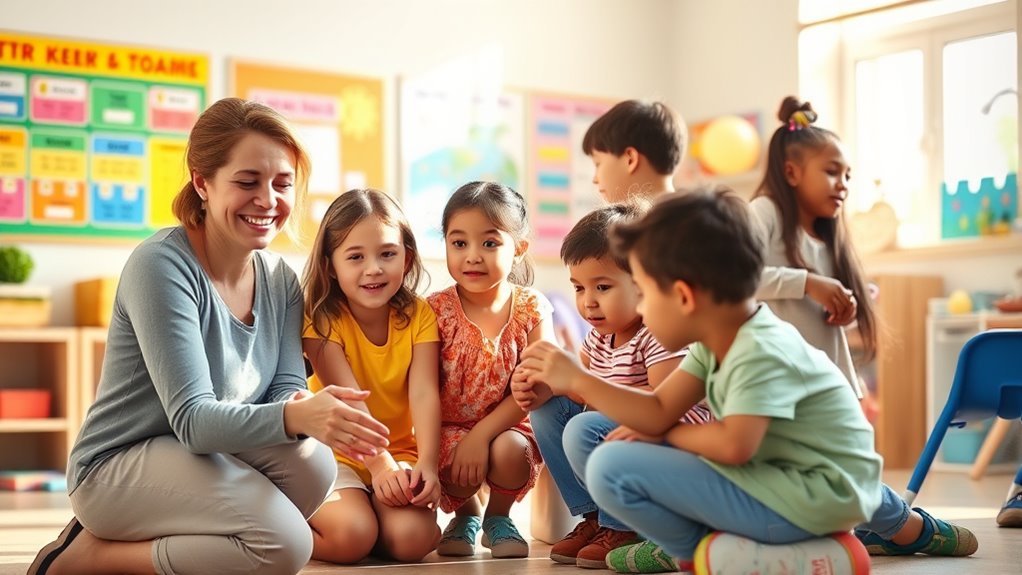Reward and punishment methods can surprisingly harm children's intrinsic motivation and emotional growth. While you might think these tactics encourage good behavior, they often lead to anxiety, fear of failure, and a reliance on external validation. Excessive rewards can distort self-image, and harsh discipline can breed aggression. Instead, fostering a nurturing relationship and promoting emotional regulation can create lasting positive changes. Discovering more about effective, collaborative approaches can transform your parenting journey.
Key Takeaways
- Excessive reliance on rewards can undermine intrinsic motivation, transforming enjoyable activities into mere tasks for children.
- Traditional punishment methods, like spanking, can increase aggression and create a fear-based discipline cycle.
- Conditional love linked to performance may lead to anxiety over failure and a distorted self-image in children.
- Engaging children in problem-solving fosters ownership and responsibility, leading to better emotional regulation.
- Positive discipline strategies, such as effort-based praise, support personal growth and healthy parent-child relationships.
Understanding the Impact of Reward and Punishment Methods

When you consider how reward and punishment methods affect children, it's essential to recognize their long-term impacts on motivation and behavior.
Rewarding a child for tasks can initially seem effective, but research shows it often leads to a decline in intrinsic motivation. Kids may start viewing enjoyable activities as work rather than fun. Moreover, parents should be aware of the potential for narcissistic tendencies to develop when excessive praise is used, which can distort a child's self-image. Additionally, understanding the importance of emotional intelligence can help parents foster healthier relationships with their children, encouraging them to navigate social situations more effectively. The lifespan perspective on development emphasizes that these early experiences can shape a child's social interactions well into adulthood. Furthermore, incorporating playful communication, akin to seniors texting humor, can enhance the bond between parents and children.
Rewarding children can diminish their intrinsic motivation, turning fun activities into mere tasks.
Additionally, physical punishment is advised against by the American Academy of Pediatrics due to its ineffectiveness and potential for negative outcomes, such as increased aggression.
Instead of relying on rewards or harsh discipline, focusing on encouraging positive behaviors helps children develop an understanding of acceptable behavior. This approach fosters self-regulation and empathy, laying a healthier foundation for their emotional and social development. Furthermore, understanding the importance of emotional regulation can significantly enhance how children manage their feelings and interactions with others. Recognizing critical periods in a child's growth can also inform parents about optimal times to teach these essential skills.
The Psychological Effects of Traditional Discipline

Traditional discipline methods, such as spanking and harsh verbal reprimands, can have profound psychological effects on children. Research shows that punishment often leads to increased aggression and mental health problems, creating a cycle of fear rather than teaching effective discipline. Additionally, fostering a positive mindset can be a crucial aspect of developing healthier discipline strategies. Children exposed to harsh verbal discipline are more likely to develop behavior issues and depression as they grow. At the same time, regular exposure to puppy training classes can promote positive social interactions and emotional regulation in children. While rewards seem appealing, they can foster dependency on external validation, undermining intrinsic motivation and diminishing creativity. The lack of healthy boundaries during discipline can further complicate a child's ability to navigate emotional challenges. Furthermore, understanding the causes of difficult behavior can help caregivers tailor their approaches to discipline more effectively.
This reliance complicates self-regulation and inner control, making it tougher for kids to develop independent judgment. Ultimately, these traditional methods can hinder children's behavior and long-term emotional well-being, emphasizing the need for more constructive approaches to discipline. Additionally, implementing mindfulness practices can help children develop better emotional regulation skills and resilience in challenging situations.
Why Rewards and Punishments Can Backfire

When you rely heavily on rewards and punishments, you might create issues like conditional love, where kids feel their worth is tied to their performance.
This can lead to a fear of failure, making them anxious about trying new things. Instead of fostering a love for learning, you could unintentionally push them away from exploring their interests.
Conditional Love Issues
Although rewards can seem like a straightforward way to encourage good behavior, they often create a conditional love dynamic that can be damaging to children. When you rely on rewards, your child might feel their worth is tied to achievements rather than their inherent value. This can lead to an obsession with success and a fear of failure, stifling their willingness to take on new challenges.
Alfie Kohn argues that tying rewards to tasks devalues the activity itself, making it feel like work instead of an opportunity for intrinsic motivation. Consequently, your child may view enjoyable activities, like reading, as unenjoyable, reducing both their intrinsic motivation and genuine understanding of positive behavior.
This cycle of conditional love can have lasting effects.
Fear of Failure
While it's common to think that rewards can motivate children, they often inadvertently instill a fear of failure that hampers growth.
When kids are pressured to achieve external validation, they may shy away from challenges, missing valuable learning opportunities.
Research shows that those rewarded for correct answers often make more mistakes, as anxiety over losing a reward stifles creativity and performance.
This dependency on rewards can diminish their intrinsic motivation, shifting focus from the joy of learning to the desire for approval.
Consequently, children may develop a reluctance to take risks, fearing failure instead of embracing the learning process.
Ultimately, this reliance on rewards and punishments can negatively impact their emotional and intellectual development.
Alternatives to Reward and Punishment Systems

Instead of relying on rewards and punishments, you can foster intrinsic motivation and collaboration with your child.
By engaging in problem-solving together and discussing emotions, you encourage a sense of ownership and responsibility.
This approach not only builds self-regulation but also strengthens your child's emotional intelligence.
Encouraging Intrinsic Motivation
To foster intrinsic motivation in children, it's essential to shift away from traditional reward and punishment systems.
Instead, focus on strategies that promote their personal growth and involvement in learning. Collaborating with children on behavior expectations encourages ownership and intrinsic motivation.
Here are some effective approaches:
- Provide opportunities for choice and voice in learning experiences.
- Emphasize effort and progress over external validation.
- Create a supportive environment that encourages positive behaviors.
Collaborative Problem-Solving Techniques
When you engage children in collaborative problem-solving, you not only help them understand their behavior but also empower them to take an active role in finding solutions. This approach prioritizes understanding their perspectives and validating their feelings, leading to positive outcomes. By involving kids in setting expectations, you foster a cooperative environment that encourages effective parenting and self-discipline. Research shows that children who participate in these discussions develop better emotional regulation and conflict-resolution skills. Utilize I-Messages and active listening to communicate needs without blame, strengthening your relationship. Here's a quick overview:
| Technique | Benefits | Tips |
|---|---|---|
| Collaborative Dialogues | Fosters ownership | Ask open-ended questions |
| I-Messages | Reduces blame | Focus on feelings |
| Active Listening | Builds trust | Reflect back what you hear |
| Joint Problem Solving | Encourages teamwork | Brainstorm solutions together |
Emotional Regulation Strategies
Emotional regulation strategies can greatly enhance a child's ability to manage their feelings without the reliance on rewards or punishments. By fostering emotional awareness, you help them develop healthier responses to stress and frustration.
Here are some effective strategies:
- Practice active listening: Validate your child's emotions, making them feel understood and promoting cooperation.
- Encourage problem-solving skills: Collaborate with them to discuss the consequences of their actions, helping them take ownership.
- Use I-Messages: Communicate your feelings and needs without blame, which supports constructive dialogue.
Establishing routines and consistent expectations also provides security, guiding your child toward appropriate behavior without relying on external rewards or punitive measures.
These strategies lead to lasting emotional regulation and healthier interactions.
The Importance of Relationship-Based Parenting

Building a strong parent-child bond is essential for effective discipline and behavioral guidance. Relationship-based parenting focuses on nurturing this bond, which helps you address your child's behavior more constructively.
By employing positive discipline strategies, you can foster an environment where your child feels understood and respected. Parents need to practice active listening and use I-Messages to communicate feelings without blame, promoting mutual understanding.
Shifting the focus from external rewards and punishments to intrinsic motivation encourages your child to develop self-discipline and a genuine interest in positive behavior. Additionally, modeling respectful communication and problem-solving skills enhances their emotional intelligence, preparing them for successful relationships in the future.
Ultimately, a strong bond leads to better cooperation and lasting behavioral changes.
Strategies for Encouraging Positive Behavior

To encourage positive behavior in children, it's crucial to create a structured environment that promotes responsibility and understanding.
As parents, you can effectively motivate your child by implementing strategies that focus on rewards and clear consequences.
Here are three key strategies:
- Use a chart system: Set clear expectations and consequences to reinforce discipline without harsh methods.
- Praise effort: Focus on effort-based praise to cultivate a growth mindset, making your child more resilient.
- Involve your child: Encourage them to help establish rules, which empowers them and strengthens your relationship.
Teaching Emotional Regulation Without Fear

Teaching your child to understand their emotional triggers is key to fostering healthy emotional regulation.
By encouraging open communication, you create a safe space for them to express their feelings without fear.
Incorporating mindfulness techniques can also help them manage their emotions more effectively, setting the stage for lifelong emotional resilience.
Understanding Emotional Triggers
Emotional triggers often reveal deeper needs in children, making it essential for parents to recognize and address them. By understanding these emotional triggers, you can improve your child's behavior and emotional responses.
Instead of relying on punishment, focus on fostering a nurturing environment that encourages emotional regulation. Here are some key points to reflect on:
- Listen actively: Help your child articulate their feelings, leading to better cooperation.
- Promote empathy: Teach your child to understand emotions, enhancing their emotional intelligence.
- Encourage self-discipline: Guide them toward internal control, preparing them for healthy emotional management in adulthood.
Encouraging Open Communication
Recognizing emotional triggers in children paves the way for fostering open communication. When you encourage your child to express their feelings openly, you create a safe environment for understanding.
Using I-Messages helps you share your feelings without blaming, promoting healthy discussions about emotions and behaviors. Active listening is essential; it validates your child's emotions, leading to better cooperation and a sense of being heard.
By helping children articulate their feelings, you nurture their emotional intelligence and equip them with skills to manage their emotions effectively. Establishing a "no-problem area" in family interactions enhances enjoyable communication, allowing your children to feel secure in expressing themselves without fear of negative consequences.
This way, good behavior flourishes.
Practicing Mindfulness Techniques
While many parents seek effective ways to help their children manage emotions, practicing mindfulness techniques offers a powerful tool for emotional regulation without fear.
By incorporating mindfulness into your child's daily routine, you encourage self-awareness and healthier coping strategies. Here are some techniques to contemplate:
- Deep Breathing: Teach your child to take slow, deep breaths to calm their mind and body.
- Body Scans: Guide them in noticing different body sensations, promoting relaxation and emotional awareness.
- Mindful Movement: Encourage activities like yoga or dance, which can enhance focus and reduce stress.
Regular mindfulness practice not only fosters positive behavior but also equips children with skills to communicate their emotions effectively.
The Role of Communication in Effective Discipline

Effective communication plays an essential role in discipline, as it allows parents to convey their feelings and expectations clearly. By using I-Messages, you can express your needs without blaming your child, fostering a more understanding environment.
Establishing clear and consistent communication of expectations helps your child understand boundaries and the consequences of their behavior. Active listening is important; it enables you to grasp your child's perspective and unmet needs, promoting cooperation.
Engaging in respectful conversations reduces resistance, making your child feel heard and valued. Additionally, involving them in setting behavioral standards encourages a sense of responsibility, leading to more effective discipline.
Developing a Collaborative Approach to Discipline

Building on the importance of communication in discipline, a collaborative approach empowers children by involving them in the process of setting behavioral standards.
This method fosters mutual respect and encourages your child to take ownership of their actions. By actively listening and engaging them in discussions, you can develop essential problem-solving skills together.
Here are some key elements of a collaborative approach:
- Establish clear expectations through routines and agreements that evolve with your child's needs.
- Utilize I-Messages to express your feelings without blame, promoting respectful dialogue.
- Focus on teaching rather than punishing to encourage long-term behavioral change.
This way, you nurture a positive environment that supports self-discipline and growth.
Moving Towards Nurturing and Constructive Parenting Techniques

As you navigate the challenges of parenting, embracing nurturing and constructive techniques can greatly enhance your relationship with your child. Instead of relying on rewards and punishment, focus on positive discipline strategies that teach appropriate behaviors.
Engage your children in setting behavioral expectations, which empowers them and fosters responsibility for their actions. Use I-Messages to create a respectful dialogue, allowing for emotional expression without blame. This approach not only nurtures mutual understanding but also supports your child's emotional regulation skills.
Frequently Asked Questions
What Is a Method of Learning That Occurs Through Reward and Punishment?
A method of learning that occurs through reward and punishment is called behaviorism.
You shape behavior by providing positive reinforcement for actions you want to encourage and applying negative consequences for actions you want to discourage.
While this approach can be effective in the short term, it's essential to recognize that relying too heavily on rewards might diminish intrinsic motivation and creativity.
Instead, consider fostering a deeper understanding of behaviors through positive reinforcement and teaching.
What Is the Method of Reward and Punishment?
So, you think bribing kids with cookies or threatening them with a timeout is the ultimate parenting hack?
Well, the reward and punishment method's all about controlling behavior—rewarding good actions and punishing bad ones.
While it sounds effective, research shows it can backfire. Kids might just chase rewards, losing their love for activities.
Plus, harsh punishments can lead to more aggression.
What Are Rewards and Punishment in Child Psychology?
In child psychology, rewards and punishments are strategies used to influence behavior. Rewards, like praise or treats, encourage desired actions by providing positive reinforcement. However, they can create a dependency on external validation.
On the other hand, punishments aim to discourage unwanted behavior through negative consequences, but they often lead to aggression or emotional issues.
Effective discipline focuses on teaching self-regulation and understanding, fostering a child's intrinsic motivation and moral development.
Is There a Right Way to Discipline and Reward Your Child?
When it comes to disciplining and rewarding your child, there's definitely a right way. Focus on teaching rather than just punishing; this helps your child understand acceptable behavior.
Use effort-based praise to foster a growth mindset, encouraging them to embrace challenges.
Involve them in setting behavioral standards to boost their sense of responsibility.
Conclusion
As you navigate the delicate landscape of parenting, envision a garden where love blooms instead of fear. By embracing relationship-based methods and fostering open communication, you'll cultivate resilience and emotional growth in your child. Instead of wielding rewards and punishments like a gardener's shears, nurture their hearts and minds with understanding and collaboration, allowing them to thrive. Remember, the most fruitful connections flourish in an environment of trust, not in the shadows of fear.









